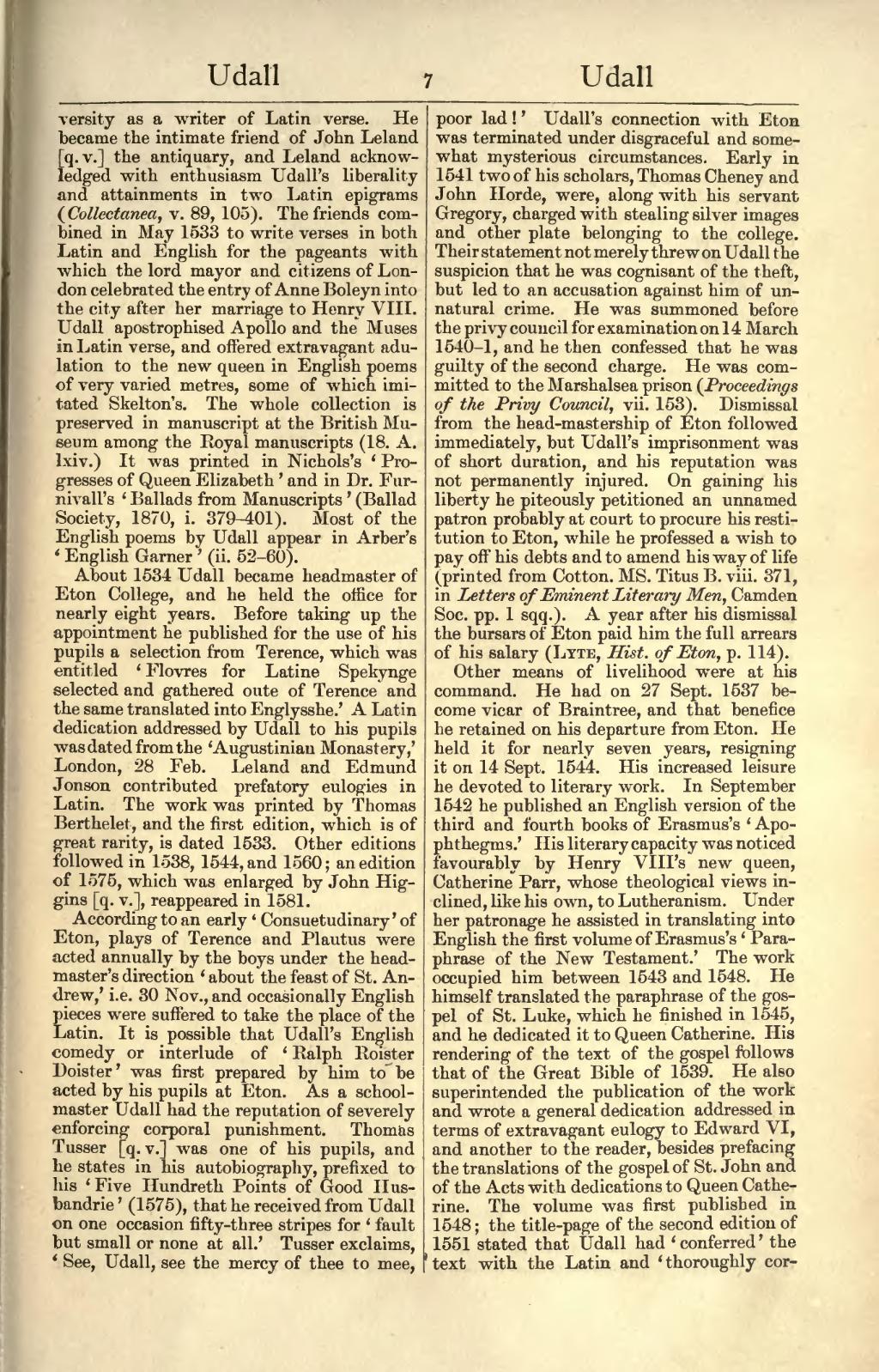versity as a writer of Latin verse. He became the intimate friend of John Leland [q. v.] the antiquary, and Leland acknowledged with enthusiasm Udall's liberality and attainments in two Latin epigrams (Collectanea, v. 89, 105). The friends combined in May 1533 to write verses in both Latin and English for the pageants with which the lord mayor and citizens of London celebrated the entry of Anne Boleyn into the city after her marriage to Henry VIII. Udall apostrophised Apollo and the Muses in Latin verse, and offered extravagant adulation to the new queen in English poems of very varied metres, some of which imitated Skelton's. The whole collection is preserved in manuscript at the British Museum among the Royal manuscripts (18. A. lxiv.). It was printed in Nichols's ‘Progresses of Queen Elizabeth’ and in Dr. Furnivall's ‘Ballads from Manuscripts’ (Ballad Society, 1870, i. 379–401). Most of the English poems by Udall appear in Arber's ‘English Garner’ (ii. 52–60).
About 1534 Udall became headmaster of Eton College, and he held the office for nearly eight years. Before taking up the appointment he published for the use of his pupils a selection from Terence, which was entitled ‘Flovres for Latine Spekynge selected and gathered oute of Terence and the same translated into Englysshe.’ A Latin dedication addressed by Udall to his pupils was dated from the ‘Augustinian Monastery,’ London, 28 Feb. Leland and Edmund Jonson contributed prefatory eulogies in Latin. The work was printed by Thomas Berthelet, and the first edition, which is of great rarity, is dated 1533. Other editions followed in 1538, 1544, and 1560; an edition of 1575, which was enlarged by John Higgins [q. v.], reappeared in 1581.
According to an early ‘Consuetudinary’ of Eton, plays of Terence and Plautus were acted annually by the boys under the headmaster's direction ‘about the feast of St. Andrew,’ i.e. 30 Nov., and occasionally English pieces were suffered to take the place of the Latin. It is possible that Udall's English comedy or interlude of ‘Ralph Roister Doister’ was first prepared by him to be acted by his pupils at Eton. As a schoolmaster Udall had the reputation of severely enforcing corporal punishment. Thomas Tusser [q. v.] was one of his pupils, and he states in his autobiography, prefixed to his ‘Five Hundreth Points of Good Husbandrie’ (1575), that he received from Udall on one occasion fifty-three stripes for ‘fault but small or none at all.’ Tusser exclaims, ‘See, Udall, see the mercy of thee to mee, poor lad!’ Udall's connection with Eton was terminated under disgraceful and somewhat mysterious circumstances. Early in 1541 two of his scholars, Thomas Cheney and John Horde, were, along with his servant Gregory, charged with stealing silver images and other plate belonging to the college. Their statement not merely threw on Udall the suspicion that he was cognisant of the theft, but led to an accusation against him of unnatural crime. He was summoned before the privy council for examination on 14 March 1540–1, and he then confessed that he was guilty of the second charge. He was committed to the Marshalsea prison (Proceedings of the Privy Council, vii. 153). Dismissal from the head-mastership of Eton followed immediately, but Udall's imprisonment was of short duration, and his reputation was not permanently injured. On gaining his liberty he piteously petitioned an unnamed patron probably at court to procure his restitution to Eton, while he professed a wish to pay off his debts and to amend his way of life (printed from Cotton. MS. Titus B. viii. 371, in Letters of Eminent Literary Men, Camden Soc. pp. 1 sqq.). A year after his dismissal the bursars of Eton paid him the full arrears of his salary (Lyte, Hist. of Eton, p. 114).
Other means of livelihood were at his command. He had on 27 Sept. 1537 become vicar of Braintree, and that benefice he retained on his departure from Eton. He held it for nearly seven years, resigning it on 14 Sept. 1544. His increased leisure he devoted to literary work. In September 1542 he published an English version of the third and fourth books of Erasmus's ‘Apophthegms.’ His literary capacity was noticed favourably by Henry VIII's new queen, Catherine Parr, whose theological views inclined, like his own, to Lutheranism. Under her patronage he assisted in translating into English the first volume of Erasmus's ‘Paraphrase of the New Testament.’ The work occupied him between 1543 and 1548. He himself translated the paraphrase of the gospel of St. Luke, which he finished in 1545, and he dedicated it to Queen Catherine. His rendering of the text of the gospel follows that of the Great Bible of 1539. He also superintended the publication of the work and wrote a general dedication addressed in terms of extravagant eulogy to Edward VI, and another to the reader, besides prefacing the translations of the gospel of St. John and of the Acts with dedications to Queen Catherine. The volume was first published in 1548; the title-page of the second edition of 1551 stated that Udall had ‘conferred’ the text with the Latin and ‘thoroughly cor-
